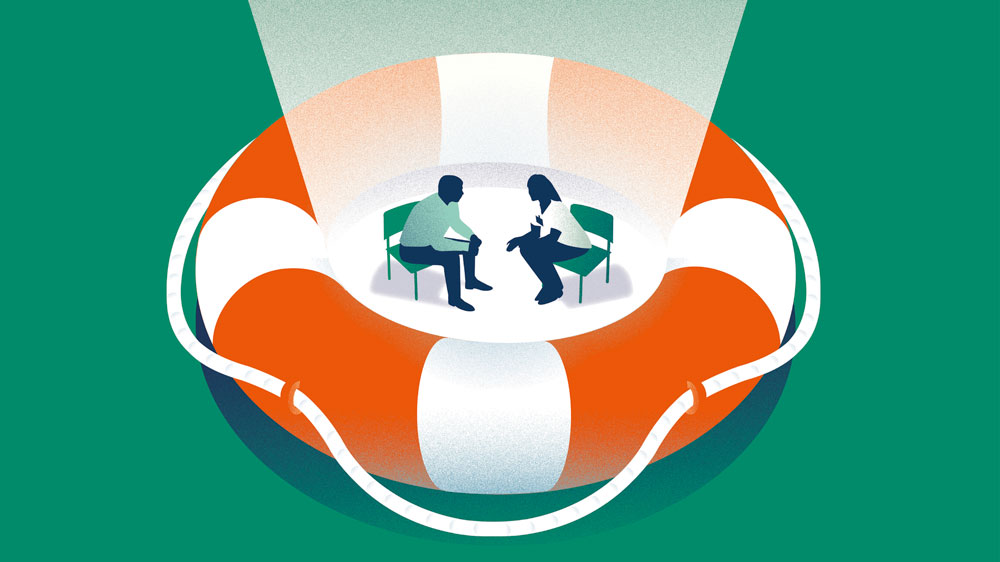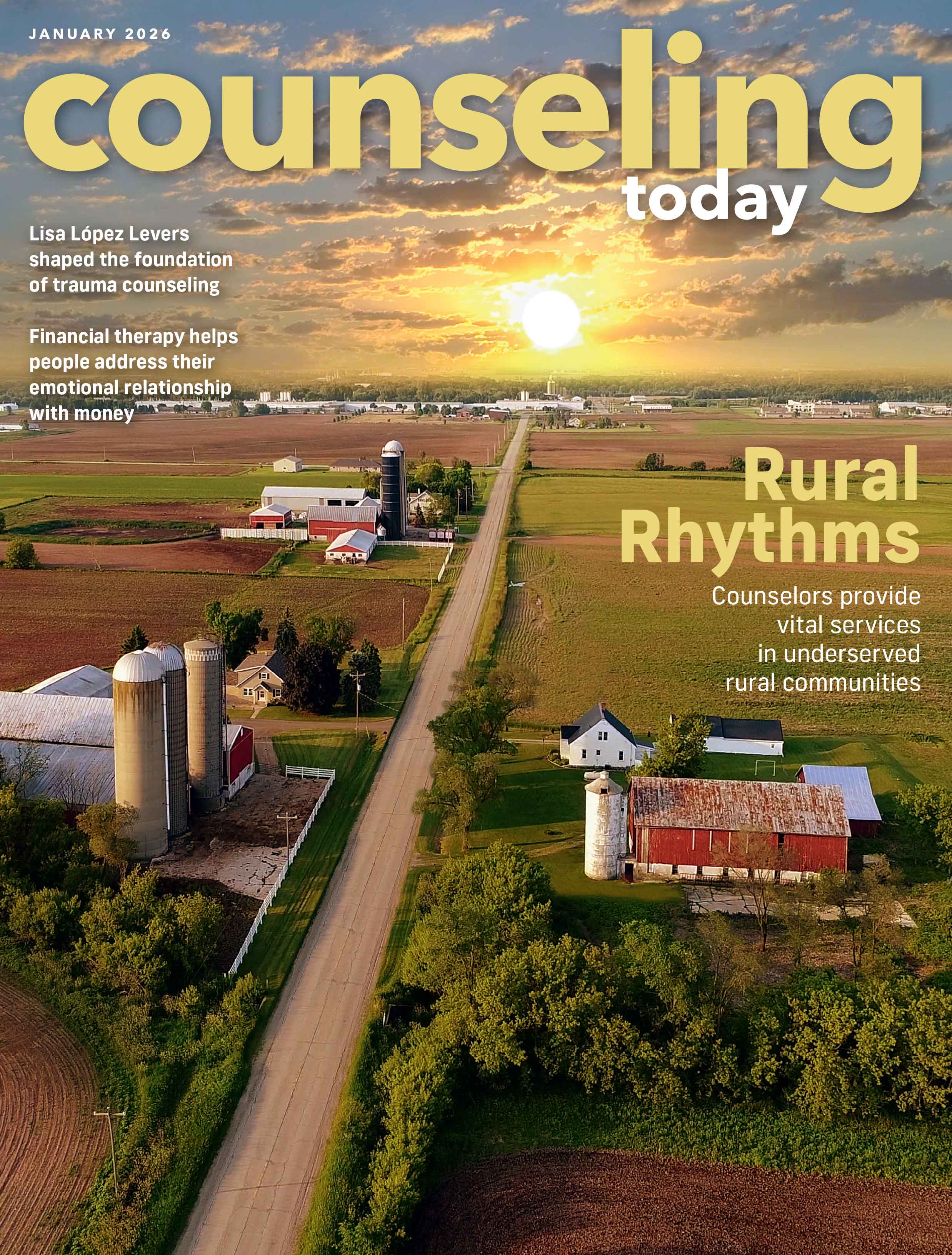Disaster Counseling
By Lisa R. Rhodes
May 2025

In the past few years, the U.S. has faced a record number of natural disasters, from hurricanes to wildfires, resulting in staggering damage. As communities rebuild, the mental health toll on survivors intensifies, demanding a shift in how professional counselors respond. From delivering psychological first aid to understanding the impact of past trauma, the counseling profession is adapting to meet the immediate needs of people affected by natural disasters and other crises.
In 2024, the warmest year on record in the contiguous U.S., according to the National Oceanic and Atmospheric Administration, the country was hit by 27 weather and climate disasters that totaled $182.7 billion in damages. These included two winter storms, one wildfire, one drought, one flood, six tornados, five tropical storms or hurricanes, and 11 other severe weather events. The 27 events of 2024 with at least $1 billion in damages trailed only the record-setting 28 events of the previous year.
Impact on Survivors
More than half of Americans have been personally affected by a natural disaster. The Pew Research Center reports 72% of Americans say they were impacted by a weather calamity in the 12 months preceding 2024.
Research shows survivors of natural disasters and other crises can be affected in many ways, especially in regard to their mental health. Anxiety, depression and post-traumatic stress are most frequently reported.
Gerard Lawson, PhD, ACA past president and current professor of counselor education and interim director of the School of Education at Virginia Tech in Blacksburg, Virginia, says traumatic events such as the shootings at Virginia Tech, Hurricane Katrina, recent California wildfires and the COVID-19 pandemic have framed how the counseling profession understands disaster mental health and what the recovery process looks like for survivors.
The counseling profession began to incorporate standards to respond to natural disasters as early as 2008. Lawson notes the 2008 CACREP standards had been nearly completed when the shootings at Virginia Tech occurred in 2007.
“CACREP, to their credit, went back and actually added language about training counselors to respond to potentially traumatizing incidents and situations, even though they were very far along in the process of being ready to roll those standards out for 2008,” Lawson says.
Lawson says the profession is learning how best to serve survivors. “Where we are today, even compared to 15, 20 years ago, is huge strides further ahead in understanding how to be effective with [counseling survivors of natural disasters] and really helping people to get onto their path of recovery more quickly.”
Psychological First Aid
Counselors who work with survivors of natural crises say psychological first aid (PFA) is becoming the standard for how mental health support is given. The priority is to ensure assistance is available immediately to reduce the effects of trauma.
Michael Verano, LPC, LMFT, has been a mental health practitioner for 40 years and has provided PFA for the past 15 years. His work began as a mental health professional in employee assistance programs, but he later was trained in crisis intervention through the International Critical Incident Stress Foundation’s model for Critical Incident Stress Management (CISM), originally used to help military service members and first responders.
“PFA is designed to reduce the initial distress caused by traumatic events and to foster short- and long-term adaptive functioning and coping,” he says.
The training includes firsthand accounts of people “devastated by events such as mass shootings, mass casualty accidents, natural disasters, hurricanes and floods.”
As part of his work, Verano has used the model to train first responders such as police officers, firefighters and 911 operators in both individual and group settings.
Mitigating symptoms in the moment and providing resources does not mean talking about making survivors better people, understanding their family dynamics or understanding where their depression comes from, he explains.
“That’s the essential piece for me. … Psychological first aid is in line with medical first aid,” Verano explains. “Where are you bleeding out? Can we stop that? And what resources do you need moving forward?
“As traumatic experiences continue to increase in both frequency and intensity, the need for PFA and CISM responses will only increase. The more clinicians trained in PFA who are then willing to train non-professionals in these responses, the better we can assist those impacted while also hopefully breaking down the stigma associated with reaching out for help with psychological concerns.”
Challenges for Counselors
One of the harder groups to train in this model are therapists, Verano admits. He says it is important they are carefully trained in counseling survivors or they can do more harm than good.
“Because therapists have a tendency to want to go for the good stuff, right? They want to get into historical, psychodynamic sort of things, family systems, and all those really deep areas that are appropriate for therapy,” Verano says.
But counselors can retraumatize survivors if they are not skilled at what they are doing — for example, if a counselor doesn’t know how to properly approach an overwhelmed survivor or quickly create a space of safety and transparency.
Verano says he worries whether they know what they’re doing. “Are they trying to do therapy? Or are they correctly doing [CISM] psychological first aid? … Can they really assist that person and not make it worse? Because I’ve seen where it’s made problems worse or people feel worse.”
After the Jan. 6, 2021, attack on the U.S. Capitol, Verano was the sole clinician working with the Virginia Law Enforcement Assistance Program. He worked with police officers trained in CISM.
“We informed [the Capitol police] that we were there to check in on how they were coping in the aftermath. We listened to their stories, normalized any distressing reactions they were having and provided resources for follow-up,” he says. “We started every day by showing up at the guard stations that were set up with coffee and donuts. Not all PFA involves talking — providing for basic needs is an important first step.”
Verano also notes that counselors who provide PFA should be prepared for secondary trauma responses and make sure they have support such as debriefs after incidents, ongoing training and supervision, and therapies related to trauma and compassion fatigue.
Considerations for Volunteering
Counselors who wish to help in the immediate aftermath of a crisis, for example, by volunteering with an organization such as the American Red Cross, should consider a few things.
Lawson says counselors can be most effective if they are part of an organization that has the infrastructure and access to support their efforts and help survivors in their time of need. They need to fight the urge to “just show up” without being tied to an established group.
“Just showing up can be really, really disruptive to the process, so they need to be part of an organization,” he says. “That can bring up a lot of our own trauma … and make it very difficult. And sometimes people just have to step back and head home instead of being able to serve the way they want to.”
Before mental health volunteers go on deployment, they need to be sure they’re in a mentally healthy place themselves and can spend time away from personal responsibilities so they can be effective in the field, Lawson explains.
Counselors should also be aware of legal and ethical considerations for volunteering across state lines.
Risk Assessment, Stress and Trauma
Karen Roller, PhD, MFT, author of the 2020 ACA Practice Brief Disaster Mental Health in the Age of COVID-19, says she wanted to examine best practices in disaster mental health during the pandemic because of the unique psychological stresses counselors, individuals and families were experiencing during a time of social turmoil.
Counselors need to learn how to regulate their own nervous system sufficiently so they can work in a disaster setting when their nervous system might be reacting to that setting.
For survivors, she says, “One of the things that our field really came to grips with is that unresolved trauma, historical trauma, communal trauma, cultural trauma comes with this chronic inflammation that results in increased medical diagnoses.”
She says preexisting chronic inflammation of stress makes it essential in disaster settings for counselors to assess where clients’ needs are going unmet on Maslow’s hierarchy of needs and reintroduce psychological first aid steps to follow. She also notes that risk assessment in disaster mental health is vital when counselors are dealing with minoritized stress — high levels of stress faced by members of groups “pressed to the margins and forced to overcome myriad forms of oppression.”
The pandemic taught counselors that the ability of survivors to access resources in the midst of chaos made a difference in their recovery.
“People suddenly were even more vulnerable because they were losing their job, were unable to work or didn’t have health insurance for lingering problems,” Lawson says. “It really caused mental health counselors to have to reckon with how we connect with people.”
While crisis counseling often raises unique challenges, it can also have benefits. “For counselors that are willing and are able to contribute in a direct way, the benefits can be really tremendous,” Lawson says. “My experience has been that my efforts, whether large or small, really bring such relief and even hope to people.”


